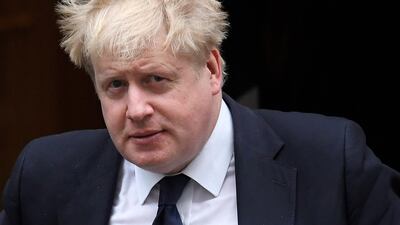British foreign secretary Boris Johnson discussed ways end Yemen's war and to save the Iran nuclear deal during talks with Oman's ruler on Thursday.
Mr Johnson's visit to Muscat was his second since December and his first stop on a two-day visit to the region hat also takes him to Saudi Arabia.
Omani state media said only that Mr Johnson's discussions with Sultan Qaboos focused on “stability in the region” but officials close to the talks said both leaders agreed on the need to end the Yemeni conflict as soon as possible.
"The main focus of Mr Johnson's Gulf visit is to give peace a genuine chance through negotiations on the Yemeni conflict. The Sultan of Oman has agreed with that concept and promised he would do all he could to support discussions that would end aggressions in Yemen," an Omani official told The National.
_______________
Read more:
UAE ambassador: Iran-Houthi missiles pose significant threat to Saudi and Emirates
Child soldiers transferred to Yemeni forces for rehabilitation
US House speaker meets Saudi king in regional security talks
_______________
British diplomats in Muscat said Mr Johnson would convey the results of his talks with Sultan Qaboos to Saudi crown prince Mohammed bin Salman in Riyadh, where he was scheduled to arrive later on Thursday.
“Johnson said he would carry the essence of the discussions he had with the Sultan to Prince Mohammed. It will form the basis of talks to try to put Saudi Arabia on the same wavelength to end military actions in Yemen," a diplomat said.
The British foreign secretary would spell out a series of steps towards peace "that would involve all feuding parties - the Houthis, the Iranians and the side loyal to the Yemeni president”.
Saudi Arabia leads a military coalition supporting Yemen's government against the Iran-backed rebels who seized the capital in 2014.
The diplomat said Mr Johnson also raised with Sultan Qaboos tougher new penalties for Iranian violations of the nuclear deal, which have been proposed by Europe to dissuade the US from abandoning the 2015 accord.
"Johnson sees Oman as crucial to broker a deal with the Iranians to fix flaws in the nuclear deal regarding Iran's current ballistic missile programme," the diplomat said, adding that Oman would be expected to get Iran to agree to "control the Houthis in Yemen".
The Yemeni rebels fired missiles at the Saudi capital late last year that were found by US and UN investigators to have originated in Iran.
Last week in Paris, US secretary of state Rex Tillerson highlighted concerns about Iran’s ballistic missile programme, which is not covered by the nuclear deal, and provisions in the agreement that allow Iran to gradually resume advanced atomic work.

